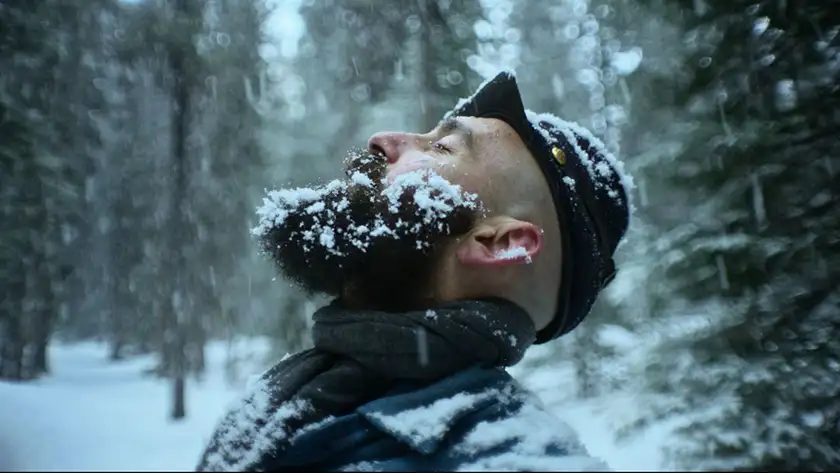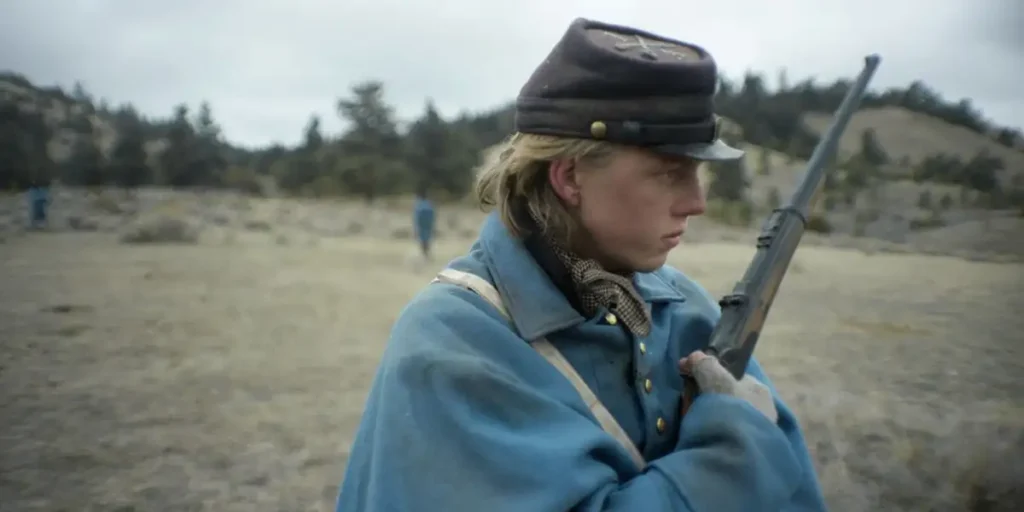Roberto Minervini’s The Damned poetically dissects the complex relationship between duty and purpose against the serene and understated landscape of America’s western frontier.
Director: Roberto Minervini
Genre: Drama, History, War
Run Time: 89′
New York Film Festival Premiere: October 8-11, 2024
U.S. Release Date: TBA
U.K. Release Date: TBA
War films typically fall into two categories: pro-war and anti-war. While this is a grand simplification of an entire genre of film, it’s a fair one. When war is the central conflict of a film, it’s hard not to make a moral or political statement on the historical events the story revolves around. Roberto Minervini proves he is disinterested in fitting into the “war film mold” in his first fiction feature The Damned.
Minervini takes a character-based approach, prioritizing the experience and perspective of the film’s fictitious soldiers who are serving in the American Civil War. Through this bold decision, Minervini is able to deconstruct the archetype of overarching good versus overarching evil and instead examine the mindset of an individual during a worsening war.
The Damned brings the audience to 1862 Montana. It’s winter time and a company of volunteer soldiers has been sent by the US Army to patrol the unchartered borderlands of the West amidst the ongoing Civil War. As the troop thins out after facing battle, the remaining men are left with less and less to distract them from the reality of war versus the glory and brotherhood they were promised. Their motives for joining the army are tested and their concepts of manhood, duty and honor begin to crumble as rapidly as the stability of their world does.
When we meet these soldiers, there is a sense they are caught in limbo. They joined up to go to war, but are simultaneously waiting for war to come to them. The American West has not yet been settled and largely remains an unexplored frontier. There are few stories discussing this particular part of America during the Civil War as it is not notable for any significant battles nor mentioned with any particular importance. The setting of Northwestern America makes the audience question the efforts of the US Army having men this far away from the action, just as the soldiers in the film are doing. The distance of our troop from the front lines of the action creates space for exploration of self, purpose and honor in this hauntingly introspective film.
The Damned opens with a long shot of three wolves eating a deceased deer. Starting the film out with such a graphic display of nature’s brutality feels like an attempt to provoke the audience. However, as the shot continues, and the audience realizes there will not be a quick cut away from these wolves ravishing the remains of a deer against this eerie, cold landscape, this choice transforms our understanding of what we are about to watch. Are the wolves vicious or just doing what they need to in order to survive?

This question haunts the rest of The Damned. Minervini’s film acts as a moral mediation on the violence of war and the ways our feelings of duty conflict with our feelings of purpose. These men are all volunteers. Throughout the story, they all end up sharing their reasons for joining up. While all their motives differ, the throughline is an uneasy call to action in one form or another.
One of the soldiers joins up for the promise of glory. Another to join his brother and his father in battle. The most potent revelation from one soldier is that he joined up because he couldn’t sit by while other men did the killing and the dying for him as he waited for the war to be over. There was an understanding at this time that joining the Army is what a man does.
As the war continues and the reality of sacrificing their lives in the name of their country materializes, the men begin to contemplate these once crystal-clear motivations. One of the troop’s youngest, and most religious, members even begins to question his relationship with God.
The intentionality in the film’s location is what makes this feature stand out amongst others in its genre. When you strip back the intensity of being on the front and the weight of the historical accuracies that need to be honored in films like these, you are left with a contemplative portrait of what these soldiers must have been feeling. You get to track their journey from times of promise to times of despair and see firsthand how the impact of war can alter the minds of even the most devoted of men.
Minervini is able to build an atmosphere within this film that is somehow both understated and all-encompassing. There’s no use for crazy explosions or jacked superstars to make the point that war is life-altering and requires strength beyond a physical sense. The western frontier and its calm, unexplored terrain serve as a serene backdrop to which the violence of war becomes heightened. While the primary battle scene is visceral, heightened by an expert sound design team, it is accurate in its portrayal of fighting versus what we think of when we imagine battlefields.
During The Damned’s singular battle, we are put in the point of view of the soldiers. We are shooting into the woods with no enemy in sight. Blindly, we hope we hit someone just to make this all end. Characters that seemed key fall because that’s what really happens during the war. Battles like these serve as great equalizers, and being portrayed with this rawness makes the audience understand how minor the motives behind war begin to feel when your brothers in arms are being killed without any remarkable circumstances surrounding their death.
In one of the final shots of the film, we see a horse tied to a post. It’s snowing harder than it has during the entire film and the only other entity in frame is a dead soldier. The Damned’s central themes are poetically and simply wrapped up in this singular shot. In the middle of nowhere, with no one around, these soldiers fight and face death without a shroud of the glory they had been promised. We the audience are left lingering in this shot, contemplating the revelations the men found during their time on the battlefield and wondering if that horse, a physical representation of the minds of our central soldiers, will ever be cut free when the dust finally settles.
The Damned is not a film about war or conflict in a simplistic sense. There is not much talk of the politics of the Civil War or the nuances of what is at stake. Instead, Minervini has created a film about being at war and the psychological changes and revelations that are subjected to occur after agreeing to put your life on the line for your country. The story is genre-bending in its approach and cathartic in its exploration of self-actualization. After leaving the film, you too may feel that part of you will stay on the Western frontier with the soldiers you have just spent time with.
The Damned will be screened at the New York Film Festival on October 8-11, 2024.

